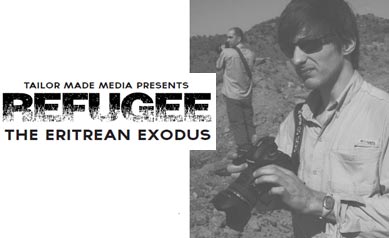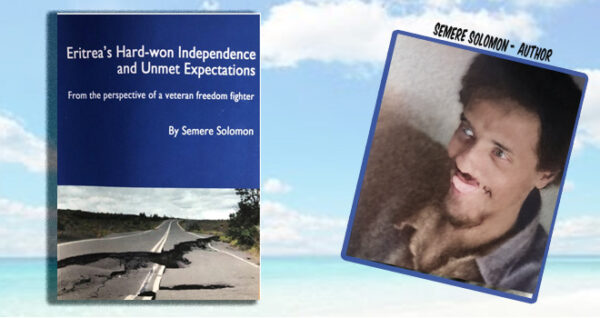August 10, 2001: The Day Eritrean Summer Was Crushed
 Early that morning, my son left home early to attend a court hearing of the President of the Students’ Union of the University of Asmara (UoA). And I was lucky enough, at least, to have been able to see him again six years later. On August 9, the UoA students held a general assembly and stood firm on their demand that the president of their union be released or charges be brought against him at court. The then President of the University ordered the closure of the cafeteria and dormitories and told the students that he has taken his hands off the whole issue. Reflecting back on it today, it looks like a deep dream. We had a relative short-lived democracy then. Since Beraki Gebresellasie (a member of the G15 later) became Minister of Information he had tried to reform the Ministry. He introduced the question and answer session with the President where at times tough questions were asked. In June 1996, the Eritrean Press Law was enacted which allowed print media to be privately owned and in 1997, Setit, the first independent newspaper after the independence of Eritrea was published.
Early that morning, my son left home early to attend a court hearing of the President of the Students’ Union of the University of Asmara (UoA). And I was lucky enough, at least, to have been able to see him again six years later. On August 9, the UoA students held a general assembly and stood firm on their demand that the president of their union be released or charges be brought against him at court. The then President of the University ordered the closure of the cafeteria and dormitories and told the students that he has taken his hands off the whole issue. Reflecting back on it today, it looks like a deep dream. We had a relative short-lived democracy then. Since Beraki Gebresellasie (a member of the G15 later) became Minister of Information he had tried to reform the Ministry. He introduced the question and answer session with the President where at times tough questions were asked. In June 1996, the Eritrean Press Law was enacted which allowed print media to be privately owned and in 1997, Setit, the first independent newspaper after the independence of Eritrea was published.
In 1999 Beraki was suspended from his post and appointed an Ambassador to Germany because he openly criticized the President (who was getting weary about the openness) for interfering in the affairs of the Ministry. He was suspended again from the ambassadorial post after signing the G15 letter. I have met Beraki only once, but unlike many other leaders of the PFDJ, he always seemed to me humble, honest and credible.
Eritrea had a thriving private press in 2000 which became highly critical of the ruling party and the Government. One would go very early in the morning, before drinking tea, to buy newspapers. What was written then is simply not easy to comprehend today. Saleh Younis describes some of this on his series on the Eritrean Spring. It was under these circumstances that the G13 ‘Open letter to the President’ was written in October 2000 and the ‘open letter to all PFDJ members’ was written in May 2001 by the G15. Awate.com has documented those events in the ‘Chronology of the reform movement’. All this would not have been possible, if it were not for the rift within the PFDJ leadership that surfaced early 2000.
To go back to August 10, the UoA students expected their President to be released during the court hearing as the police had failed to bring charges against him. The president of the union was not brought to court and so the hearing was adjourned again. The students who came to hear the court proceedings were detained when they left the court room as all the surroundings were cordoned by the soldiers. All students with university IDs were rounded up from the streets. Every one detained was taken to the stadium. The students did not even demonstrate, they did not break a single cup of glass. All they asked for was the release of the President of their union or charging him in court. It seemed a carefully planned operation. It reminded one of Pinochet’s Chile of 1973 when people were rounded up in stadiums. By noon, my son didn’t show up and it became clear he was detained. We went to the stadium to check. One could hear the loud screams from inside.
I remember the day very well. I was to scheduled to leave Asmara that night to Oslo for a research collaboration project with the Veterinary College, there. As I was the only one of the signatories to the G13 letter inside Eritrea then, I felt at risk of being arrested any time. I was not sure even if I would be allowed to leave the airport. It was a rainy day. Anxious mothers gathered at the stadium until late at night where the students were kept without food. My daughter was also then doing her ‘summer service’ so I did not see her either, when I left. To have the young ones away from home was quite common. Our neighbor’s kid who was left alone (he had 4 brothers) with his parents, reflected on this. He told his mother one day that two of his brothers (naming them) were in the ‘summer service’ and the other two were in Sawa. He then said, ‘Mamma fah bitten atyuna’- we are all scattered everywhere. I did not know then, this would be the last time I would see my late wife, she died 10 months later. I was supposed to return back after a short trip, but ended up as a refugee after the 18th of September. Some of the anxious mothers who gathered at the stadium until late at night were beaten by the soldiers for refusing to go away. Some of the graduate assistants and others who had summer classes and who were detained were released the same evening or next day. The first information on what happened in the stadium became known through them.
The next day August 11, buses were brought in and the students were told to embark. The students demanded to know who was detaining them and taking them away before boarding the buses. They said they just wanted to know who would be responsible. They were living in that short-lived dream of some openness they have experienced that year. The soldiers started beating them up. They screamed. The mothers who had gathered outside shouted and screamed knocking on the door of the stadium. The security agents that were present there were scared. One security car had to run away from the scene. More soldiers were brought it and tried to intimidate the mothers. The mothers stood firm, but to no avail. The students were forced to get on the buses and left the stadium amid the screaming of the mothers. The incident was recorded by video by amateurs; unfortunately it has not become public yet. If there is anyone who has any footage of video, I request them to publicize it.
Though mothers saw off waves of their children leaving to Sawa and summer service regularly, it was the first time for them to see their loved ones leave screaming. The buses headed towards the Massawa road and nobody had the slightest imagination that they were taken to Wia (a place that entered the history of oppression), one of the hottest places on earth. The same day, remaining university students were told to report the next day early at the stadium. These were also taken to Wia in the same way on August 12. Two of the students, Yirga Yosef (who died two days after his trip to Wia) and Yemane Tekie died there. Years later, the Eritrean human rights activist collected a testimony of gruesome treatment the students experienced from the time they were arrested to the time they were released on November 7, 2001. Elsa deserves credit for that and for her continued engagement helping Eritreans in need and for exposing the abuses of the regime.
I reflect on the calls for a peaceful change and call for demonstrations of youth in Eritrea and find it difficult to imagine what would have happened if all of the students had refused to get on the buses despite the severe beatings. How many of them would have died and how long the operation would have continued? What would have been the reaction of the army? How would have the people reacted? Could it have been crushed with a mass massacre? Could it have resulted in a popular uprising? There were no mobile phones then, the internet was very limited and tightly controlled and still is? I just wonder! Imagine this was the time the G15 were not imprisoned though they have been stripped of their positions and banned from travel and the PFDJ had started a smear campaign against them.
It seems their arrest and the brutal way they were handled was meant to pave they way for the arrest of the G15 and crackdown and any form of peaceful resistance including the private press. The Asmara filled with fear they returned to, was changed forever, it was no more the relatively democratic one they left. The country was silenced since then. The University was dismantled gradually has been dispersed in different locations.
What was the students’ crime? Though the issue of conflict was not political, the students had a set precedence. They had said NO to the establishment, NO to the PFDJ, collectively and publicly. Not only this, but they said this at a vulnerable time, when some leaders of the PFDJ were openly challenging the President. It had to be nipped in the bud.
Background to the issue of conflict
University students used to participate in the poorly planned and executed ‘summer service’ program- during their high school period. The ‘summer service’ program was initiated in 1994 for high school students and has no legal entity and has been controversial since then. The university students took military training before joining the university and are still obliged to do a full year national service before they graduate. During the third Ethiopian offensive, they volunteered to serve in the frontlines. As all other Eritreans, they are sons and daughters, brothers and sisters of those on national duty. They needed to support their families and support themselves to meet extra expenses related to their studies. They studied under severe constraints related to the resources of the university. Studies done at that time by the students union showed that the university on the average spent 2-3 Nakfa/head for food while other institutions such as the Teachers Training Institute spent close 10 Nakfa/head. The Head of the state, as a Chancellor of the University, had never presided over any graduation ceremony. One can understand why the President did not like the university.
During the first the First International Conference of the Eritrean Studies Association Eritrean Studies that was held in Asmara (22-26 July 2001), almost 50 % of the papers presented were from the University. Some high quality papers were presented by senior students. The papers showed that the university students had an independent line of thinking and the so-called ‘National Union of Youth and Students’-mother-in-law of the current YPFDJ in the diaspora, had totally failed to corrupt and regiment their thoughts, despite all resources available for it. It was headed by Ali Abdu, then. Many of the papers presented at the conference were highly critical of the policies of the Government. One of the presentations that got a standing ovation was that of Taeme Beyene, the Chief Justice then, who openly accused the President of the State of interfering in judicial matters.
The issue of conflict between the University and the Students’ Union was on basically payment for the students during a ‘summer service’ program that year. There were consultations between the two sides which resulted in two alternatives. Either to collect data on damage done during the Ethiopian offensive or to work on an Aids awareness campaigns. Both campaigns were to be financed by the World Bank and the UNDP. The University offered a low payment of 800 Nacfa/month and the students refused. During the graduation ceremony on 28 July 2001, the Union President, Semere Kessete, a law student, elaborated the difficulties that students faced during their studies. Three days later, he was detained and his whereabouts were not known. On August 2, the students held a general assembly and demanded the release of their President or bringing him to court if there were accusations against him. The campaign continued until the events that led to August 10.
On regime change: lessons to be learned
It is 10 years since August 10, 2001. It is an important day in Eritrean history and I think the events that took that day paved the way for what happened on September 18 and the absence of any resistance, then. Anyone thinking on peaceful means of resistance need to reflect what happened that day and why. Those non-political peaceful demands were brutally crushed under the nose of the G15 who were openly challenging the President at that time. It was crushed when we had a relative margin of a democratic space. The state has become much more brutal and violent since. How would a demonstration demanding regime change (if there could be on) be treated under the absence of facilities to transmit what happens there to the outside world?
Eritrea is neither Tunisia nor Egypt which allowed some forms of opposition parties and where internet and social media use, is more spread. Eritrea is more like Libya and Syria where regimes are more authoritarian and brutal in crushing any forms of opposition. History in sub-Saharan Africa shows that regime change of brutal dictatorships has taken place through outside help as was the case of in the fall of Idi Amin in 1978 (with support from Tanzania) or the fall of Charles Taylor of Liberia in 2003 (rebels threw him with support from neighboring countries), the end of the civil war in Liberia in 2000 (through the intervention of Nigerian-led UN forces assisted by the British army), the fall of Gbagbo in April this year (army of the President-elect with the help of the UN, mainly French forces stationed there) in Ivory Coast. The realities in the Arab world are quite different from sub-Saharan Africa. It is a much poorer and neglected region in the world. The use of satellite dishes and internet is not as spread as in the Arab world. There is no ‘Aljzeera’ that could show events as they unfold. There was no daily news on TV stations on the brutal events that took place in the Congo. Even oil rich Nigeria, does not get much coverage. The only event in Africa that is widely covered in western media is the African Football Cup Tournament or severe forms of famine when they occur.
I am not advocating violence. Peaceful means of resistance is the best option if feasible. Any thing is possible, but in Eritrea it doesn’t seem so. Violence breeds violence. Nobody likes violence unless it is forced on him/her. The Eritrean people exhausted all means of peaceful resistance in the 50’s and 60’s until armed struggle was waged as a last option. Today the regime uses all forms of violence against the Eritrean people and those who feel even their existence is threatened like the Affar and the Kunama and others have taken up arms though this has been ineffective, too. Who am I to condemn these groups if they aim to protect their rights? But I have a clear message to them: do not target the Eritrean defense forces deliberately. Those who breach peaceful means of resistance either because of their close affiliation to the regime (or they just want to maintain the status quo) or out of genuine interest should tell the regime (not the opposition) not to use violence. For me if any opposition group uses force against the regime the bottom line should be not to target the Eritrean defense forces (as they are victims themselves) but to target the regime nerve center, its command and control and its main economic base (such as mining). We need to appeal to and win the Eritrean defense forces to our side. Any force needs to be surgically applied. Those who advocate peaceful means have so far failed to provide a clear strategy on how it is to be implemented. All they tell us is to let the regime will evolve to democracy. How, when and for how long we have to wait, we do not know. Even those organizations who do not rule out force or who practice it have no clear strategy, either. All they provide us with are communiqués that state the casualties they have inflicted on the ‘enemy’. There is no clear strategy on how to integrate these different armed groups, be it at present or after we re-claim back our country. Some others, simply dream that the brutal regime in Eritrea will simply deliver roses if people demonstrate. Be it the use of selective force or otherwise we need clear strategy.
*This article is based (it has been updated) on a detailed account I wrote on September 4, 2001; at Awate.com under a pen name with the title ‘The plight of the students of the University of Asmara’ (could not find the link on the archive)




Awate Forum